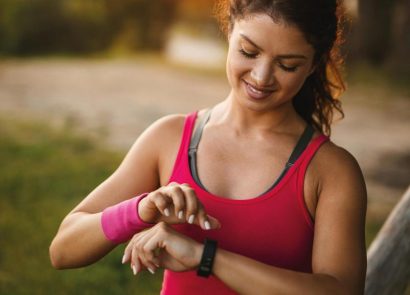From hormones to heart health, we’ve rounded up the best expert advice you and your family need to stay in top health this month
First came monitoring our steps, with many of us strapping on fitness watches and aiming to reach that golden number of 10,000 a day. Then nutrition tracking arrived, followed by sleep, which brought with it the advantages of knowing how much rest you were getting, but also the anxieties of discovering you haven’t had enough! Now, it’s stress that’s at the forefront of wearable tech developers’ minds in 2021, and for good reason. Even before the challenges of 2020, stress had been described as an epidemic in the UK – back in 2018, a survey by mentalhealth.org.uk found that 74 percent of UK adults have felt so stressed at some point over the last year they felt overwhelmed or unable to cope. However, before we get caught up in the hype, we turn to the experts to find out how accurate these trackers really are, and whether or not it’s beneficial for our wrists to inform us of our current stress levels.
Getting technical
You feel a buzzing from your wrist, but it’s not your smartwatch informing you that you’ve reached your step count for the day, but rather it’s sensed you’re feeling frazzled and need to take a break. It may sound odd, but big brands that you would associate with fitness trackers, such as Fitbit and Garmin, as well as companies including Apple and Samsung Health, have started to include stress monitors in their products. But how does the technology work, and is it actually accurate? “To my knowledge, it works using biofeedback markers to track things like our heart rate and temperature which can be used to measure our stress levels and psychological state,” explains Dr Elena Touroni, a consultant psychologist and co-founder of The Chelsea Psychology Clinic (thechelseapsychologyclinic.com). “When it comes to the feedback we get from physiological measures, then yes, it’s likely to be accurate information.” So are there any drawbacks? “Obviously this is only one source of data,” says Dr Touroni. “When we look at stress, we might also want to look at our thinking styles and our emotions.”
Stressing about stress
When sleep trackers became popular, they had the unfortunate side effect of creating a new disorder in some users, termed orthosomnia. This occurred when people became unhealthily obsessed with getting the perfect night’s sleep, to the extent that it actually caused sleep issues. Could something similar happen with stress trackers, and cause users even more anxiety? Is it better to not know how tense we are? “Like anything, it’s always better to know, but knowing without application isn’t what will make the difference,” says Jessica Boston, a multi award-winning therapist and hypnotherapist (jessicaboston.com). “It’s like knowing how to make a recipe you never end up cooking. What will really help is what you do with that information and what action you take as a result. If you just sit with that knowledge and say “I’m stressed and this device confirms it, this is who I am there is nothing I can do about it!” and spend time reinforcing that belief, nothing much will come of it, but if you use the information like a detective to determine how, and why, you are stressed and in which contexts, you will be able to change your life.”
Dr Touroni agrees, adding that it depends on how we use the information from our wearables: “The risk is that we start ruminating on it, and this can increase our anxiety levels,” she warns. That said, many of these wearables offer features to help ease stress if they sense you’re feeling tense, such as mindful breathing and meditation exercises.
Fit kit
Wearables have made big strides away from their humble beginnings as pedometers, but why have stress monitors been included into what is essentially a piece of equipment for logging fitness? “Mental health is physical health, the mind and body are one unit working together,” Jessica tells us. “So understanding more about how, why and when you do stress, is going to have an impact on your body working at the most peak physical state available to you.”
However, are these trackers actually necessary, or can we continue relying on how we’re feeling inside, rather than an external monitor? Dr Touroni believes so, on certain conditions. “It provides a relatively objective measure rather than our subjective experience,” she says. “It’s important that it’s used with both caution and some reflection but overall, it’s an interesting development.”
Jessica agrees, saying that she thinks it’s always a good thing if people are more aware of their stress. “If people are able to take their emotional temperature, so to speak, it will lead to a better society if we are more selfaware. It is positive that people are becoming more proactive about taking responsibility for their stress and realising that they have more power than they might have previously believed to do something about it.” However, she doesn’t believe that you need a tracker in order to do this. “It’s something you can do by paying attention to your patterns of behaviour and being gently curious about your body and mind,” she says. “I can see how trackers might be helpful to someone who doesn’t know where to start, but it’s something you need to be able to have conversation about with the unconscious mind, which is behind the powerful processes in charge of the stress responses.
Shop stress trackers
Fitbit Charge 4, £129.99, fitbit.com

You can enjoy guided breathing sessions based on your heart rate with this Fitbit.
Samsung Galaxy Watch 3, £399, samsung.com

Leave your phone at home – this watch also offers stress tracking and sleep monitoring.
TicWatch E2, £144.69, amazon.co.uk

This watch uses the Google Fit platform to offer guided breathing features from your wrist.




















